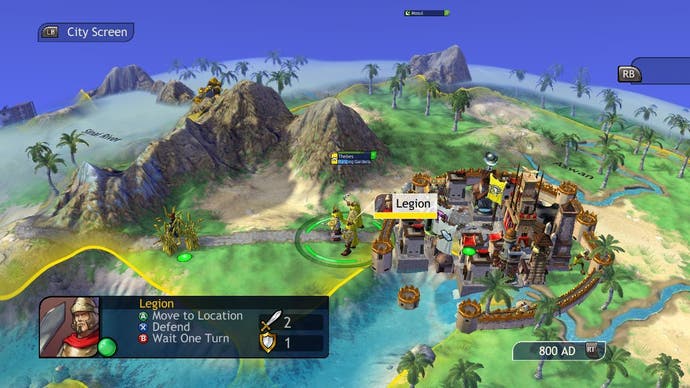Sid Meier's Civilization Revolution
We'll be first against the shop wall.
I was initially a bit surly when I sat down to play Civ Rev (or Civilizution, as I like to call it). People kept telling me what to do. Get away from me, I gestured with dismissive hand-flaps. I may even have hissed, like an angry cat. I know how to play Civ, thank you very much. Or so I thought. Yes, I knew perfectly well what everything was, and exactly what I was trying to achieve. I didn't, however, know how to make it happen in this new, console-specific remake. This was because it was simpler, more obvious - because it wasn't expecting me to already comprehend Civ's elaborate mechanisms. I had to unlearn hard in order to learn easy. I felt a little like I'd spent years diligently crushing and fermenting grapes whenever I fancied a tipple, only for some passing helpful soul to observe that they sell wine for four quid a bottle in Tesco's. Oh. Right. Yes, that does make more sense.
It's very much still Civilization - don't worry about that. Most of the strategy stalwart's organs have survived their next-gen transplant intact (360 code was on offer at the event we attended, but it's also on PS3), and yet it immediately seems more amicable and manageable than its PC predecessor. Civ 4 did wonders for a series previously in danger of death by feature creep, but it was still a little daunting to entirely novice eyes. With a worry-disarming cartoonish graphical style - The Sims is a clear influence, even down to characters' nonsense-speak - and large, friendly menus distilled into the bare essentials rather than the stat-attack of yesteryear, this is genuinely a new Civ for a new audience.

While prior console versions have simply seen the PC's mouse controls and itty-bitty icons mapped wretchedly onto a d-pad, this really is a fresh start. One thumbstick orders, the other stick looks, and suddenly navigating a vast worldmap seems no trouble at all. Granted, it eats all the controller buttons it can, but subtly retains brief legends of what does what throughout the game, so memorisation isn't a problem. Nor is pressure - this is turn-based strategy, not real-time warmongering. Though there are new checks and balances to ensure you're not sat around for bloody ages while the AI or opposing players take their turns, you're not ever going to lose because you're weeping and mashing buttons at random in a desperate attempt to make something happen before it's too late.
With apologies to the old hands, let's have a quick recap of what Civ (and Civ Rev) is for anyone new to it - or who's shunned it purely because it's turn-based, historical and usually on PC. Those things are not going to be a problem for you here. It's about conquering the world - by military might, by democracy, by culture or by technology. You build cities, which in turn build armies and structures to aid your nation's growth, and generate research to advance you through the ages of humanity. Then you fight everyone, or impress everyone, or build a bloody great space rocket to spread your civ to a new planet. As your technology advances, so too does the look and feel of Civ Rev. So, at the start of the game, you'll be clobbering your neighbours with pointy sticks; by the end you might be dropping nukes on 'em.

In single-player, you're up against a world full of AI-controlled nations, but the finest thrills are likely to come from multiplayer, where you're up against despicable human beings and all their lies. While alliances are easily declared, betrayal is expected - so you'd better do the betraying first. Interestingly, Civ Rev positively eggs you on to military skulduggery - defeating a hostile barbarian tribe might see their leader spill the beans about how another player's city is undefended, or an AI nation might drop vital gossip when you ask them for their thoughts on a rival civ. Co-op play is in there too, and I rather suspect that's going to prove the biggest draw - teaming up with a chum you know you can trust to seize the planet from a host of aggressive AI civs. There's also some fascinating tech that lets players drop in and out of games without ending the session - if someone quits, the AI will coolly take control of their civ, while a new player can step into an AI nation's shoes. It's obvious, but it's super-smart - as it's an awful feeling to not get to finish your match because one player has to go and salve his mother's verruca.




